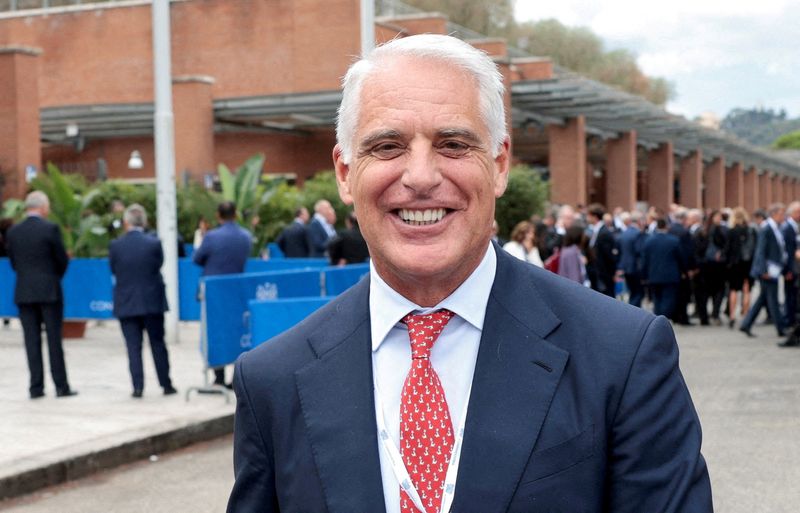Orcel, the dealmaker determined to redraw Europe’s banking map
2024.09.30 03:38
By Valentina Za and Stefania Spezzati
MILAN/LONDON (Reuters) -Upon taking the top job at Italian bank UniCredit in 2021, Andrea Orcel, a veteran M&A adviser, vowed not to repeat the mistake he saw many CEOs make: cave in to pressure to do deals.
The chance to pursue a rare cross-border European banking marriage, a combination deemed near-impossible by friends and foes alike, was the moment to go all in.
Orcel riled the German establishment this month by stealthily buying a chunk of Commerzbank (ETR:) and pressing for a tie-up with Germany’s second-biggest publicly-traded bank.
A merger would create a new big pan-European bank that regulators have long encouraged to better compete with Wall Street giants, but politicians have often resisted.
“It’s shrewd, it’s bold, and he’s determined. He doesn’t take no for an answer,” said Filippo Alloatti, head of financials credit at fund manager Federated Hermes (NYSE:), who is an investor in both UniCredit and Commerzbank.
In preparation for a deal, Orcel has overseen a more than four-fold increase in UniCredit’s share price. UniCredit is significantly more profitable than the German rival it has long coveted, despite being hobbled by the higher debt costs Italy attracts.
“There remained a big strategic question: What is UniCredit’s future going to be?” Alloatti said. “Now we have an answer.”
Orcel’s plan has been slammed by German Chancellor Olaf Scholz as an “unfriendly attack” along with the bank’s board members and employees who fear losing their jobs.
Clinching a cross-border European merger big enough to redraw the map would offer him a second shot to show big, complex banking deals can work.
He was a key architect of the Royal Bank of Scotland (NYSE:)’s acquisition and breakup of Dutch ABN Amro, one of the most disastrous deals in banking history that ended in the collapse of both lenders in the global financial crisis.
Orcel has yet to hire an external adviser as formal merger talks with Commerzbank are not underway, a person with knowledge of the bank’s strategy said. The 21% of Commerzbank that UniCredit has gained exposure to with shares and derivatives for now is just a financial investment, Orcel told a banking conference this week.
The 61-year old has said he will walk away from a potential deal if he cannot have it his way: “Do not underestimate how disciplined we are,” he told the event.
Yet his early moves signal a desire to forge ahead.
A source close to the bank said the backlash that followed the unveiling of UniCredit’s initial 9% stake in Commerzbank on Sept. 11 prompted a change in tactics.
After Germany’s government signalled it wouldn’t sell any more of its Commerzbank shares, UniCredit built a bigger stake with derivatives. The European Central Bank, as the chief regulator, needs to sign off on investors owning more than 10% of a bank’s stock.
UniCredit declined to comment for this article.
ROUTE TO THE TOP
Orcel’s current and former colleagues describe a restless and demanding style, in part behind a high turnover of top managers and division heads at UniCredit, a sharp contrast with the steady senior leadership of its bigger cross-town rival, Intesa Sanpaolo (OTC:).
While head of UBS’ investment bank he grew impatient as he sought to become a CEO. He left in 2018 to take up an offer to become Santander (BME:)’s chief executive but the Spanish bank withdrew its proposal in a disagreement over pay. Orcel sought damages and was awarded millions after a public court battle.
UniCredit insiders say Orcel is fiercely private about his decision-making and intelligence he gathers, a habit formed as an investment banker when he wouldn’t even tell his employer what he had discussed with clients, according to one.
When he first arrived at UniCredit, one director told Reuters of being surprised that he would not hand out hard copies of presentations at meetings but only project slides from his computer to protect confidentiality.
Unlike some peers, he says, he does not court political ties. At an event in Rome last week, Orcel lined up to greet Italian Prime Minister Giorgia Meloni but turned about when faced with a queue, a Reuters eyewitness said.
He has repeatedly shown he won’t shy away from upsetting or challenging those in power.
He angered Rome when, in 2021, at the last minute he abandoned a deal to buy troubled state-owned Monte dei Paschi. More recently, UniCredit challenged the ECB over the regulator’s request that the bank reduce its business in Russia.
In his latest battle, Commerzbank’s incoming CEO Bettina Orlopp has pledged to keep the bank independent and trade unions to fight any takeover. A German election in 2025 may stiffen opposition even if the government, which still owns 12% of Commerzbank, has no obvious means of blocking Orcel.

One person who has known Orcel for years and has worked for him said he had “backed himself into a corner” in pursuing a deal with Commerzbank amid so much opposition but he has a keen sense of creating a legacy.
“This transaction would really be the most important cross-border M&A that we’ve seen in Europe,” said Luca Evangelisti, investment manager and head of credit research at Jupiter Asset Management.








